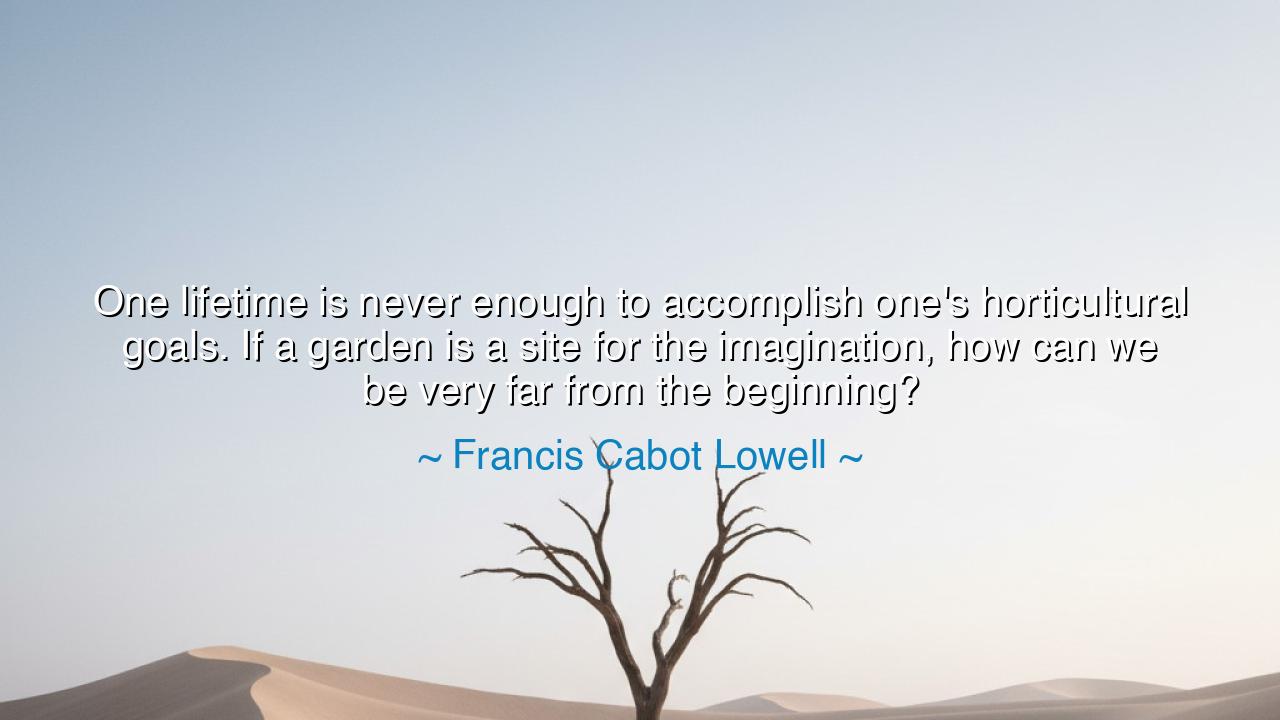
One lifetime is never enough to accomplish one's horticultural
One lifetime is never enough to accomplish one's horticultural goals. If a garden is a site for the imagination, how can we be very far from the beginning?






O Seekers of Wisdom, listen closely to the words of Francis Cabot Lowell, whose reflection on the timeless pursuit of gardening offers a profound meditation on life, growth, and the nature of aspiration. "One lifetime is never enough to accomplish one's horticultural goals. If a garden is a site for the imagination, how can we be very far from the beginning?" In these words, Lowell reminds us of the boundless nature of our desires and the continual process of creation that gardening symbolizes. Gardening is not merely the planting of seeds, but the cultivation of a space where dreams, ideas, and visions take root, grow, and evolve. The garden is, in essence, a mirror of the soul, always expanding, always reaching for something greater.
In the ancient world, the act of creating a garden was seen as a sacred task, one that reflected not just the human capacity for creation, but the divine will itself. The Egyptians, with their meticulous gardens along the Nile, created lush spaces that were as much about beauty and sustenance as they were about spiritual connection. The Greeks often likened the cultivation of a garden to the cultivation of the soul—Plato and Aristotle both saw gardens as places of intellectual reflection, where one could not only nurture the earth but also nurture the mind. In this sense, a garden was not just a task to be completed, but a lifelong pursuit—a site for the imagination, where one’s efforts never quite meet their limit, where the cycle of growth mirrors the cycle of life itself.
Consider, O Seeker, the great Roman Emperor Hadrian, who constructed one of the most famous gardens of antiquity, the Villa Adriana. This garden was not merely a retreat; it was a place of immense creativity and personal expression, filled with architecture, sculptures, and natural beauty. Hadrian’s garden reflected his own imagination, and it became a space where his visions could evolve, never fully completed but always in the process of becoming. Even the most magnificent gardens, like Hadrian's, are never fully finished—they grow, change, and adapt to the needs of those who care for them. Lowell’s wisdom reflects this truth: in gardening, as in life, there is always more to be done, always room for expansion and creativity.
Gardens have long been places where the limits of time and human effort meet. The great Japanese Zen gardens, with their simplicity and attention to detail, are designed not to be finished but to be perpetually revisited, their form ever-changing as the seasons pass. The Zen gardener does not seek to complete the garden, but rather to live within it, allowing it to shape their mind and spirit. The garden is not a destination, but a journey, much like life itself. Lowell’s words resonate with the idea that, just as a garden is never truly finished, so too is the pursuit of personal growth, understanding, and fulfillment—a process that stretches across lifetimes and transcends the limitations of time.
The lesson, O Seeker, is deep and revealing: gardening—like life—is an act of continuous creation. It is not about the achievement of an end, but the joy found in the act of becoming. To seek to accomplish one’s horticultural goals in a single lifetime is to misunderstand the very nature of what it means to grow. Much like the gardener’s care for the soil, we must tend to our own spirits, always striving for something greater, but never fully believing we have arrived. Imagination and creation are boundless forces, ever-expanding and ever-reaching. To create, whether in the garden or in life, is to engage in a process that never truly ends, a journey that, though endless, provides joy in every step.
In practical terms, O Seeker, consider the gardens of your own life. What are the goals you are tending to, and how can you embrace the process of creation with a heart that knows it may never be fully realized? Whether it is your career, your relationships, or your inner growth, the key is not in finishing the task, but in finding joy and meaning in the ongoing work. Embrace the idea that every planting—every effort you make—contributes to the greater vision, even if that vision is not immediately apparent. Be patient with yourself, knowing that the fruits of your labor will come not in a single season, but through years of dedication, care, and persistence.
So, O Seeker, take this wisdom into your own life: gardening teaches us the importance of process, patience, and creativity. Just as the gardener never stops planting, pruning, and nourishing, so too must you embrace the continuous unfolding of your own life. Recognize that you will never "finish" your garden, nor will you finish becoming the person you are meant to be. But in this endless pursuit, you will find fulfillment in the act of creation itself, in knowing that the work is never in vain. Plant your seeds, and allow them to grow and flourish in their own time. Let your garden, like your life, be a place where imagination and creativity bloom in an eternal cycle of growth.






AAdministratorAdministrator
Welcome, honored guests. Please leave a comment, we will respond soon